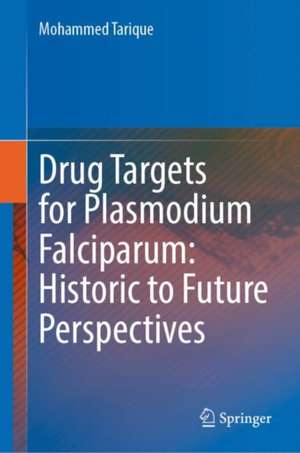Drug Targets for Plasmodium Falciparum: Historic to Future Perspectives
Autor Mohammed Tariqueen Limba Engleză Hardback – 19 iun 2024
Preț: 784.79 lei
Preț vechi: 957.06 lei
-18% Nou
Puncte Express: 1177
Preț estimativ în valută:
150.18€ • 155.85$ • 125.53£
150.18€ • 155.85$ • 125.53£
Carte disponibilă
Livrare economică 22 februarie-08 martie
Preluare comenzi: 021 569.72.76
Specificații
ISBN-13: 9789811944833
ISBN-10: 9811944830
Pagini: 199
Ilustrații: XIII, 199 p. 56 illus., 48 illus. in color.
Dimensiuni: 155 x 235 mm
Greutate: 0.52 kg
Ediția:2024
Editura: Springer Nature Singapore
Colecția Springer
Locul publicării:Singapore, Singapore
ISBN-10: 9811944830
Pagini: 199
Ilustrații: XIII, 199 p. 56 illus., 48 illus. in color.
Dimensiuni: 155 x 235 mm
Greutate: 0.52 kg
Ediția:2024
Editura: Springer Nature Singapore
Colecția Springer
Locul publicării:Singapore, Singapore
Cuprins
Chapter 1. Introduction: An overview of Malaria and Plasmodium.- Chapter 2. Pathogenesis of Plasmodium falciparum.- Chapter 3. Antimalarial Drugs and drug resistance.- Chapter 4. Metabolic pathways of Enzymes: Therapeutic targets and prospects for Innovative antimalarial drugs.- Chapter 5. Targeting apicoplasts in Plasmodium falciparum, origin and pathways.- Chapter 6. Proteases and protein kinases as potential drug target.- Chapter 7. Plasmodium falciparum: Transporter and Drug Target.- Chapter 8. Enzymes of isoprenoid biosynthesis and control of malarial parasite plasmodium falciparum.- Chapter 9.Ubiquitin-Proteasome system as a potential drug target for Malaria.- Chapter 10.Food Vacuole as a Drug Target.
Notă biografică
Dr. Mohammed Tarique currently holds the prestigious position of Dr. D.S. Kothari Postdoctoral Fellow at the Center for Interdisciplinary Research in Basic Sciences (CIRBSc) located within Jamia Millia Islamia, India. With a distinguished academic background, Dr. Tarique earned his Ph.D. in Plasmodium Biology from the renowned International Centre for Genetic Engineering and Biotechnology in New Delhi, India. His research endeavors are primarily focused on delving deep into the biology of Plasmodium, with the ultimate goal of contributing to the development of innovative drugs to combat malaria.
Over the course of his career, Dr. Tarique has made significant contributions to the field of Plasmodium research, authoring more than 20 research articles that have been published in leading peer-reviewed international journals. Dr. Tarique is editorial board member of various respected journals including, International Research Journal of Engineering and Technology, the American Journal of BioScience, and the Cell & Cellular Life Sciences Journal, among others.
Over the course of his career, Dr. Tarique has made significant contributions to the field of Plasmodium research, authoring more than 20 research articles that have been published in leading peer-reviewed international journals. Dr. Tarique is editorial board member of various respected journals including, International Research Journal of Engineering and Technology, the American Journal of BioScience, and the Cell & Cellular Life Sciences Journal, among others.
Textul de pe ultima copertă
This book offers a comprehensive exploration of malaria, a life-threatening disease affecting millions globally, with a focus on the parasitic organisms of the genus Plasmodium that cause it. It discusses the challenges posed by the disease, especially in economically developing regions, and delves into the biology and pathophysiology of the Plasmodium species, including their genetic flexibility and resistance to treatments. Special attention is given to P. falciparum, the most dangerous of these parasites, detailing its complex life cycle, interaction with human hosts, and the severe clinical manifestations it can induce. The book further explores the global health concern of antimalarial drug resistance, highlighting the WHO's efforts in combating the disease and the necessity for novel treatments. Innovative research directions, such as targeting the unique organelles of Plasmodium like the apicoplast and employing proteasome inhibitors, are thoroughly examined as potential strategies in the development of new antimalarial drugs. Additionally, it addresses the critical role of the hemoglobin digestion process in the parasite's lifecycle, presenting it as a promising target for therapeutic intervention. This work is an essential resource for researchers, clinicians, and policymakers involved in malaria control and drug development, providing insights into the current challenges and future directions in the fight against this endemic disease.
Caracteristici
Reviews novel molecular targets for antimalarial drug development Explores metabolic enzymes as druggable targets against malaria Examines Plasmodium Kinases as potential drug targets for malaria
